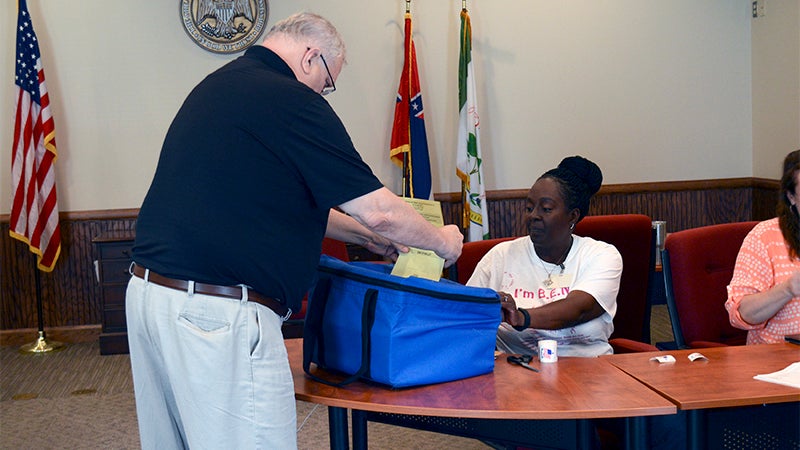County voting machines, paper ballots used in small elections due to cost
Published 7:00 am Friday, June 9, 2017

- A Poplarville voter places his paper ballot into the ballot box during the mayoral runoff on May 16. File photo by Julia Arenstam
In March, the Poplarville Board of Aldermen decided not to rent voting machines and scanners from a private company for the primary and general elections. If they had, it would have cost the city about $4,000, according to previous coverage.
Instead, the Board voted to use paper ballots and have poll workers hand count the votes at the end of the night, a process that took about three hours Tuesday as each vote for alderman was read aloud.
But, Pearl River County owns 151 voting machines, which were purchased in 2007, Pearl River County Election Commissioner Reggie Hanberry said.
The Board of Aldermen never discussed using the county’s machines for the city elections.
Those machines are generally used only for county-wide elections, like the special election that will be held in July, Hanberry said.
The machines cost about $800 a piece, but require a yearly maintenance contract, Hanberry said.
Though the machines are paid for, he said they have to be stored in a temperature-controlled environment, which adds to the cost.
A budget is established for each election based on the number of poll workers needed—a minimum of three are required at each precinct—election commissioners and any technicians required to set up the voting machines prior to the election, Hanberry said.
However, County Administrator Adrain Lumpkin said election commissioners are able to program the machines for one-race ballots without the assistance of outside technicians.
Generally, simpler and less complicated elections are conducted via paper ballots.
Paper ballots take less time to use and prepare, Hanberry said, especially in a runoff election where there are just two candidates and only a handful of precincts are voting.
For the special election on July 25, Hanberry said the county will use the machines in the 13 districts that will be voting.
He said depending on the size of a precinct, there could be as many as nine poll workers stationed at one site.
Poll workers are paid $125 per day, he said.
Hanberry said elections require about the same number of poll workers regardless of whether the machines are used or not.
Large elections, like the presidential election last November where all 32 precincts are voting, normally cost the county between $30,000 and $39,000, Lumpkin said.
Yet, special elections cost about a third of that, he said, because candidates don’t run on a party platform so electronic ballots don’t have to be double stacked.
Lumpkin said about five poll workers would be stationed at each of the 13 precincts, costing about $8,000.
But with extra staff at the courthouse and overtime in the Circuit Clerk’s office, that number could be closer to $10,000 he said.
The advantage of using the machines is that a tally could be ready almost immediately after an election ends, Lumpkin said.
During Pearl River County School District’s bond election in March, the District leased a scanner that automatically tallied paper ballots, he said.
However, Lumpkin said the cost to purchase a scanner for all 32 county precincts is too high right now.
Lumpkin said the Pearl River County Board of Supervisors is not against lending out the county’s voting machines to either municipality if they request them, but a reasonable fee would have to be worked out between the two entities to cover the cost.





